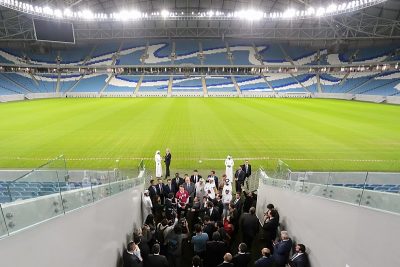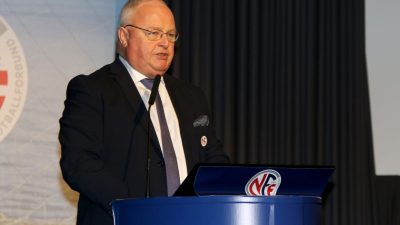Norway’s football federation (NFF) managed to avoid discussion over the weekend on rising calls to boycott the upcoming World Cup in Qatar. Now it may be up to the national football team’s players themselves to take up the ball, or at least try to make the international football federation FIFA more human-rights oriented.

It was a disappointment, but no surprise, for boycott advocates when NFF refused to address the grassroots uproar in Norway over Qatar at its so-called fotballtinget (a major national gathering) on Sunday. As commentator Reidar Sollie observed in Oslo newspaper Dagsavisen on Monday, the 146-61 vote against putting the boycott demand on the agenda “offers a hint that the desire to boycott is not massive in the digital meeting room.”
NFF did decide, however, to set up a commission to examine the consequences of a boycott, and scheduled an extraordinary meeting in late June to discuss the commission’s findings. It remains highly unlikely that NFF will go along with the boycott demanded by a growing list of football clubs around the country: NFF’s administrative leaders have already claimed that a boycott of the highly controversial World Cup in Qatar would mean a loss of more than NOK 100 million in revenues in 2021 alone. That in turn would mean much less funding for both top clubs and football in general in Norway.
All about money
“For NFF there’s one value they work for in this situation, and that’s money,” claimed Jan Petter Saltvedt, sports commentator for Norwegian Broadcasting (NRK). Saltvedt cut through all the fat and “play-acting,” as he called it, by NFF officials who’ve suggested “dialogue” is a better means of influencing World Cup hosts in Qatar than a boycott.
“Football President Terje Svendsen’s dialogue line is as credible as Norwegian politicians’ insistance that human rights issues will be taken up when they visit Chinese authorities,” Saltvedt claimed. “It’s just phrases. Everyone knows that and everyone really just wants it that way.” Not the Norwegian football clubs and fans, though, who are disgusted by how FIFA awarded the World Cup to Qatar in 2010 amidst alleged corruption (16 of FIFA’s 22 officials voting in favour of Qatar’s bid have since been either suspended, charged or landed in prison), and not least by all the reported deaths of workers building World Cup facilities in Qatar.

It was The Guardian’s recent report revealing that an estimate 6,500 foreign workers have died in Qatar since 2010, 37 of them while building World Cup stadiums, that sparked Norway’s “Qatar Uproar.” It began three weeks ago in the northern city of Tromsø, where former national team player Tom Høgli and two other officials of Tromsø Idrettslag (Athletic Association) decided “we had to do something,” as Høgli told newspaper Aftenposten.
“The fact that corruption, modern slavery and a high number of dead workers are now at the core of the most important thing we have, the World Cup, is absolutely not acceptable,” Tromsø’s club asserted in a press release. From there the ball started rolling.
Other clubs, backed by their supporters, joined in the denouncement of the Qatar World Cup and called for the boycott. By last week, clubs calling for a boycott included Brann of Bergen, Vålerenga of Oslo, Viking of Stavanger, lots of smaller clubs and, ultimately, Rosenborg (RBK) of Trondheim, where an overwhelming majority at the club’s annual meeting demanded RBK support a boycott. That was the opposite of RBK’s board’s position, which, like NFF, doesn’t want a boycott. It was also a clear rebuke to RBK’s board leader Ivar Koteng.
Playing on a ‘graveyard’
The debate at RBK’s meeting bordered on being passionate, reported state broadcaster NRK, not least when RBK member and the former head of its fan club, Kenneth Kjelsnes, stated that “if the World Cup kicks into action in Qatar next year, it will take place on a graveyard.” The only thing that would have any effect on how Qatar or FIFA regards workers, believes Kjelsnes, would be to turn Qatar’s World Cup into “an embarrasing and humiliating fiasco.”
“Only then can we maybe bring an end to how football championships are something that can be bought by dictators and used to try to clear their own repression,” Kjelsnes concluded.
The Rosenberg vote was a real wake-up call for Svendsen and his colleagues at NFF, aimed at forcing them to take some action themselves. Svendsen, who has said all along that boycotts aren’t the “right way to go” in trying to change things, nonetheless managed to postpone further debate for now.
The ball isn’t dead, though, with several newspapers editorializing in favour of a boycott on the grounds Qatar’s leadership “violates all those that sports and football try to abide by.” Newspaper Dagsavisen, for example, wrote last week that Qatar “is a state with institutionalized modern slavery and which in practice is an apartheid state, with a small, powerful overclass and an underclass of workers with no rights. This can’t be reconciled with hosting the football family.”
Late last week, the new head coach of Norway’s national football team threw some cold water on the “Qatar Uproar,” but raised prospects for another form of protest against Qatar. Ståle Solbakken, who needed to present his first team late last week for upcoming World Cup qualifiers against Gibraltar, Turkey and Montenegro, announced that he doesn’t support an actual boycott but urged other means of protest.

“The entire situation around the Qatar World Cup is terrible,” Solbakken told reporters. “I understand the demand for a boycott very well … but urge more attention on how the World Cup is being played in the wrong country.” He said he fully intends to promote discussion and awareness of human rights violations in Qatar among team players.
“It can be that the football president (Svendsen) won’t like hearing that, but I want to dive into this,” Solbakken said, “and we have a player group who can get involved.” That means young Norwegian football stars like Martin Ødegaard of Arsenal, named by Solbakken as Norway’s new team captain, and Erling Braut Haaland of Dortmund, are likely to get involved, too.
“When he (Solbakken) has chosen Ødegaard as captain, there’s an implicit demand that he (Ødegard), too, must talk about Qatar at international press conferences,” wrote commentator Sollie wrote on Monday. He noted how Ødegaard completely agreed with Solbakken when he faced reporters at a digital press conference on Saturday from his new base in London: Ødegaard goes along with “”no’ to a boycott, but ‘yes’ to other means” of putting pressure on Qatar. It remains unclear exactly what other means may be used.
The World Cup itself can’t be moved now, critics concede it’s far too late in the process. They hope, however, that the “deafening silence” up to now from players, football officials and perhaps even sponsors may be over. Most agree that at least in Norway, the grass roots protests can’t be ignored for long, while others are already pointing to more budding protests over another major upcoming sports event: the next Winter Olympics in China, also in 2022.
NewsInEnglish.no/Nina Berglund

